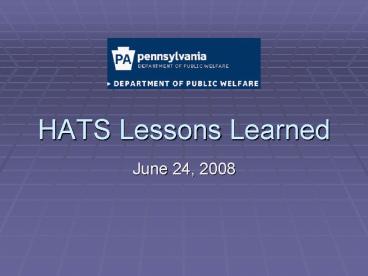HATS Lessons Learned - PowerPoint PPT Presentation
1 / 17
Title:
HATS Lessons Learned
Description:
Action Planning Be reasonable, ... Timeline Start Date Phases/Activities Strategy Initiation Planning Execution & Control Project Closed Lessons Learned ... – PowerPoint PPT presentation
Number of Views:80
Avg rating:3.0/5.0
Title: HATS Lessons Learned
1
HATS Lessons Learned
- June 24, 2008
2
Agenda
- Ground Rules
- Goals
- Lessons Learned Defined
- The Team
- Game Plan
- Action Plans
- Next Steps
3
Ground Rules
- Turn your cell phone to silent.
- No interruptions or judgments.
- If names MUST be mentioned,
- keep it professional.
- no personalities.
- Contribute openly to the discussion.
- Identify needed actions explicitly.
- Others you would like to add?
4
Goals
- Learn from our experiences.
- Engage in a dialogue that will give each of us a
view of alternative perspectives. - Improve team communications.
- Create an action plan for application on future
initiatives.
5
What is a Lessons Learned Session?
6
Lessons Learned Defined
- A retrospective of past events or actions.
- Brainstorming ideas for working more effectively
going forward. - Developing actions for applying lessons learned
to future initiatives. - Improving team communications.
7
The Team
- Facilitator
- Hearings Appeals
- DPW Bureau of Information Systems (BIS)
- Project Management Office (PMO)
- Division of Enterprise Applications (DEA)
- Division of Technology Engineering (DTE)
8
Game Plan
- Create the Timeline
- Identify positive, neutral, and negative
events/actions that occurred during the project. - Timeline Walkthrough
- What worked well?
- What still puzzles us?
- Prioritize identified issues.
- Action Planning
- Be reasonable, in terms of what is doable.
9
Create Timeline
- List actual events or milestones in chronological
order. - Not yet identifying whether it was good or bad.
- Typically this is a shared view of what happened
when, fact-based.
10
Timeline
- Start Date
- Phases/Activities
- Strategy
- Initiation
- Planning
- Execution Control
- Project Closed
- Lessons Learned June 24, 2008
11
Timeline Walkthrough
- For each event/milestone identify
- what worked.
- what did not work.
- Identify areas to focus on rather than specific
solutions. - Give examples.
- Dont assume or infer.
12
Areas to Consider
Project Management Technical Management Human Factors Overall
Project Planning Requirements Communication Customer Satisfaction
Resource Management Specifications Team Experience Technical Success
Risk Management Test Plan Interaction with Project Sponsor Quality Product
Change Control Construction Interaction with Customer Product Accepted
Procurement Testing Interaction with Management On Time
Budget Management Rollout Management Support Within Budget
13
Time-Out
14
Action Planning
- Prioritize issues to be addressed.
- Identify how each issue could be resolved in the
future. - Dont be too ambitious in any one action.
- If necessary, decrease the scope of the action to
something that could be realistically achieved.
15
Action Planning
- What type of action is it?
- Short-term fix?
- Root cause solution?
- If outside of your sphere of responsibility, how
can you influence the decision-makers? - Who is responsible for each action?
16
Next Steps
- Retrospective output will be written and shared
with the group. - Action Plan will be published within the PMO for
use on future efforts with Hearings and Appeals,
as well as with other BIS supported projects.
17
Thank you for coming! Your voice is very
important to the Bureau of Information Systems.
We look forwarding to working with you soon!
Contact Carole Hussey, 717-772-7980, or
chussey_at_state.pa.us































